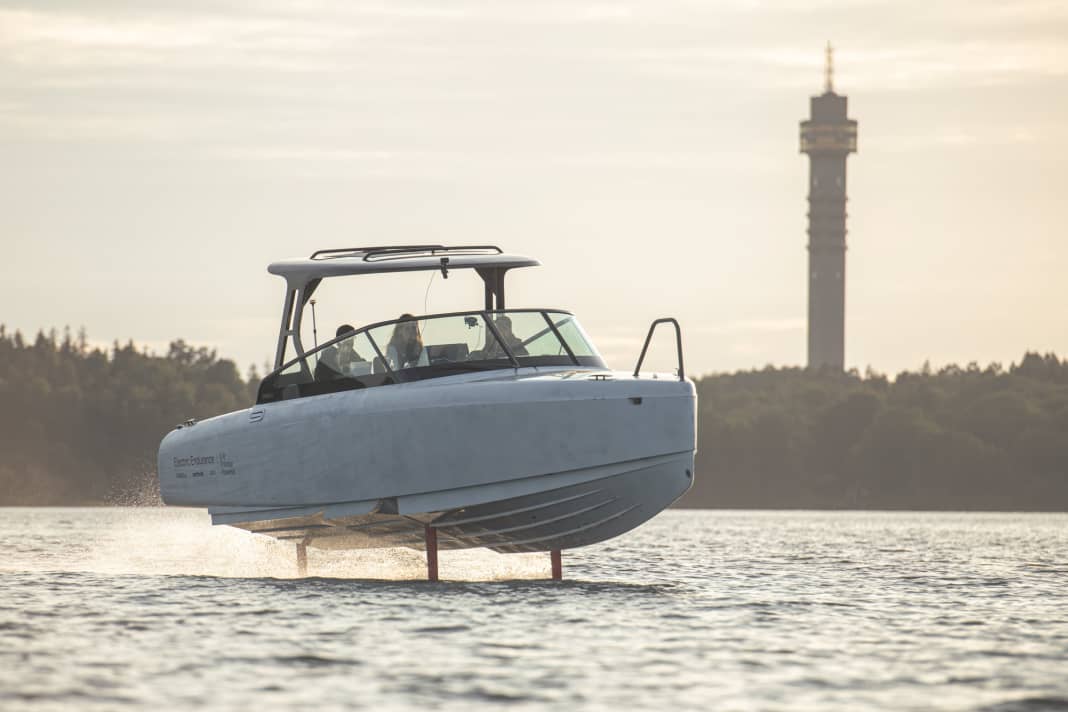





What would it be like to travel from London to Amsterdam and back in 24 hours on an electric boat? In the electric endurance competition, the Candela C-8 covered a distance equivalent to this journey. In doing so, it set a new world record for the longest distance travelled by an electric boat in one day. This was announced by the Swedish boat and ship manufacturer Candela in a press release.
The latest model of the electric boat covered 420 nautical miles within 24 hours in the Stockholm archipelago - the equivalent of 777 kilometres or 483 miles. The previous record was 79 nautical miles, which were travelled within 20 hours.
"This achievement shows that fast, electric transport on water over long distances is already feasible today and not just in the distant future," says Gustav Hasselskog, CEO and founder of Candela. He was at the helm of the C-8 during the record attempt.
Candela uses hydrofoil technology
According to the manufacturer, the usual planing e-boats have problems due to friction in the water and this leads to shorter ranges. The Candela C-8 utilises hydrofoil technology, i.e. wings that are attached under the hull. This method reduces energy consumption by 80 per cent. As a result, the range is two to three times greater than that of conventional electric boats.
There is a partnership with the electric car manufacturer Polestar, which supplies both the batteries and the charger for the Candela C-8. The boat can be charged with direct current. For the first time, longer journeys on battery power are now possible.
17 knots as average speed
The record run was made possible by the mobile Voltpack battery storage system from Northvolt, which was used to charge the C-8 with direct current during the record run. On the dock were a 281 kWh Voltpack system and a Plug DC charger, which enabled the C-8's battery to be charged quickly.
The average speed during the 24-hour journey was 17 knots, even taking into account the loading breaks. The route consisted of a loop between Stockholm and the island of Tynningö. A DC charge was carried out after each loop.
Findings from the record journey with the Candela C-8
- The distance covered in 24 hours is equivalent to travelling from Amsterdam to London and back - or between Trondheim and Stavanger.
- The C-8 could have crossed the English Channel between Dover and Calais 20 times in 24 hours.
- With an average speed of 17 knots - including loading breaks - the C-8 was able to cover the distance from Stockholm to Finland in 13 hours, three hours faster than the Finland ferry.
- As the e-boat travelled at full speed (27 knots) most of the time, it consumed 685 kWh during the journey, which equates to around 110 to 120 euros in electricity costs. A conventional petrol-powered boat, on the other hand, would consume around 750 litres of petrol, which would cost around 1400 euros.
Charging station network for European passenger transport on the coast?
Candela carried out the record-breaking journey in collaboration with battery manufacturer Northvolt and charging station provider Plug to demonstrate what future DC charging networks for boats in island groups and remote coastal areas could look like. Instead of investing heavily in expanding the local power grid, islands can use battery systems such as Voltpack to ensure there is enough power for fast charging, the press release continues.
"With a relatively modest investment, charging stations could be built to fully electrify shipping in the Stockholm archipelago. For a few hundred million euros, a network of charging stations could be realised for European passenger transport along the coast," explains Gustav Hasselskog.
This autumn, Candela is also launching the new passenger ship Candela P-12 Shuttle for 30 people. It can navigate most of the world's coastal waterways while offering a sustainable and much more cost-effective alternative to today's fossil-fuelled shipping, which is responsible for three per cent of global greenhouse gas emissions.
Electric endurance competition
The competition route consisted of a 20 nautical mile loop between Frihamnen and the island of Tynningö. During the 24 hours, the C-8 was charged for a total of 313 minutes and received a total of 615 kWh of electrical energy. Each charge took about 18 minutes and the battery was charged from about 13 per cent to 66 per cent state of charge (SOC). The Candela C-8 had an average charging speed of around 118 kW.
The e-boat maintained an average speed of just over 17 knots during the race, including the loading breaks. During the journey, the target speed was 27 knots.
- Further information: www.candela.com

